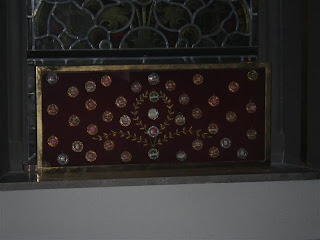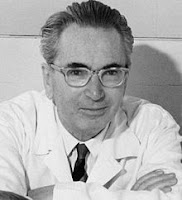When I was growing up, my mother used to tell me to pray to St. Philomena whenever I was deeply troubled about problems that seemed to have no solution. She had given me a framed picture of St. Philomena and her biography so that I could read about her life. Later, after Paul and I had already married and moved into our house, my sister, knowing my devotion to St. Philomena, had purchased a bumper-sticker sized magnet for my refrigerator that said "St. Philomena: Powerful with God." It was a constant reminder to me that I could always turn to St. Philomena whenever I was in need. I used to think that I would name my first daughter "Philomena" in honor of this beloved saint, which, of course, didn't happen because my only daughter is named Mary Therese after the Blessed Mother and one of my other favorite saints, Therese of Lisieux.
One of my favorite stories that my mom would share with me about this sweet saint was that whenever one of your prayers to her was about to be answered, she would playfully announce it by knocking three times. I was always listening for mysterious knocking noises in the hopes that St. Philomena was on the job, but can't recall ever hearing them.
Over the years the framed picture, the book and the magnet have all been misplaced, and sadly, I haven't given St. Philomena very much consideration in my prayer...or so I thought.
Recently a friend of mine called me to talk with me about her daughter who has been seriously ill. I encouraged her to pray to St. Philomena although I'm not sure why she was the one saint out of thousands who first came to my mind. After our phone call ended, I completely forgot that I had encouraged her to pray to St. Philomena. But then she called me a week later and told me that she had learned about a group of pilgrims from the United States who would be traveling to visit the Sanctuary of St. Philomena in Mugnano Del CardinaleAvelino, Italy. She had asked them to take her daughter's picture with them and to pray for her there, which they lovingly agreed to do. Then she learned that there is a Shrine of St. Philomena right here in our home state of Wisconsin. Furthermore, the shrine is only a two hour drive from our home, in Briggsville, Wisconsin. My friend told me that she would be traveling there on the same day that the pilgrims would be visiting the Shrine in Italy. I begged her to let me come with her and my boss agreed to let me have the day off from work.
I was so excited about going to the Shrine with my friend, but, unfortunately, the weather wasn't going to cooperate. The forecasters predicted lots of snow which would make that long drive treacherous. We decided to postpone the trip to Briggsville for a warmer season and will make a little hometown pilgrimage instead, visiting some of the Seven Most Beautiful Churches in Milwaukee for Mass and adoration. And on our pilgrimage we will be fervently invoking the intercession of St. Philomena who is powerful with God. Please join us in prayer, if you are able, by praying the Novena prayer at the bottom of this page. I hope that one day in the near future, I will be able to report that St. Philomena played an important role in the healing of my friend's daughter.
About St. Philomena
Her bones were discovered in 1802 in the Priscilla Catacombs in Rome with the Latin inscription for "Peace to you, Philomena" etched above, and the symbols of arrows, a lance, an anchor and a lily signifying that this was the tomb of a martyr. The relics were tested and found to belong to a young girl about 14 years of age who had been martyred as early as the year 160 AD. Later, in a private revelation, Mother Maria Luisa was told the beautiful life story of this young virgin martyr saint who was given to the Emperor Diocletian by her Christian parents in exchange for a promise of peace. As Philomena refused the advances of Diocletian he tormented her physically again and again with imprisonment, beating and drowning. Each time he unleashed his wrath, angels and the Blessed Mother came to the assistance of St. Philomena, restoring her to health. One of the most dramatic events occured when six archers sent their burning arrows toward her and through heavenly assistance the arrows changed direction killing the men who had sent them. Many who witnessed this event were converted to the faith. Following this failed attempt at killing St. Philomena, Diocletian had her beheaded on August 10th.
Following the discovery of her tomb, many have invoked her intercession including many Popes and well-known saints. St. Piux X and St. John Vianney have particularly well-known devotion to her. On January 13th, 1837, Pope Gregory XVI named her the Patroness of the Living Rosary and proclaimed her to be the great wonder-worker of the 19th century. Her mission is to draw us to the Immaculate Heart of Mary. Her name means "daughter of light." St. Philomena is the patroness of babies, children and youth.
You can learn more about St. Philomena here or by visiting the links above for the Shrine's in Mugnano and Briggsville.
Novena Prayer to St. Philomena
We beseech Thee, O Lord, to grant us the pardon of our sins by the intercession of Saint , virgin and martyr, who was always pleasing in Thy sight by her eminent chastity and by the profession of every virtue. Amen.
Illustrious virgin and martyr, Saint Philomena, behold me prostrate before the throne whereupon it has pleased the Most Holy Trinity to place thee. Full of confidence in thy protection, I entreat thee to intercede for me with God, from the heights of Heaven deign to cast a glance upon thy humble client! Spouse of Christ, sustain me in suffering, fortify me in temptation, protect me in the dangers surrounding me, obtain for me the graces necessary to me, and in particular (Here specify your petition). Above all, assist me at the hour of my death. Saint Philomena, powerful with God, pray for us. Amen.
O God, Most Holy Trinity, we thank Thee for the graces Thou didst bestow upon the Blessed Virgin Mary, and upon Thy handmaid Philomena, through whose intercession we implore Thy Mercy. Amen.




































